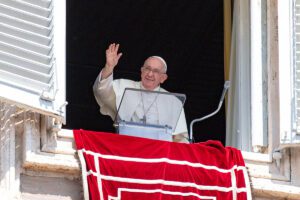VATICAN CITY (CNS) – Christians must stand firm in their faith but that is not the same as being rigid and unwilling to bend out of compassion for another, Pope Francis said.
God is love and “the one who loves does not remain rigid. Yes, they stand firm, but not rigid; they do not remain rigid in their own positions, but allow themselves to be moved and touched,” the pope said Aug. 20 before reciting the midday Angelus prayer with an estimated 10,000 people gathered in St. Peter’s Square.

Among the crowd were 29 seminarians who had just arrived to begin their studies at the Pontifical North American College, the U.S. seminary in Rome. Pope Francis gave them a shoutout and wished them “a good formation journey.”
In his main talk, Pope Francis commented on the day’s Gospel reading, Mt 15:21-28, which tells the story of the Canaanite woman who asked Jesus to heal her daughter. At first, Jesus brushes her off since she is not Jewish. But he sees her persistent faith and grants her request.
“Later,” the pope said, “the Holy Spirit would push the church to the ends of the world,” but at that point Jesus was preaching to the Jews.
“Faced with her concrete case, he becomes even more sympathetic and compassionate,” the pope said. “This is what God is like: he is love, and the one who loves does not remain rigid.”
“Love is creative,” he said. “And we Christians who want to imitate Christ, we are invited to be open to change.”
In the life of faith and in relationships with others, the pope said, people need to pay attention and to be willing “to soften up in the name of compassion and the good of others, like Jesus did with the Canaanite woman.”
Of course, he said, another aspect of the story is the woman’s strong and insistent faith that Jesus could heal her daughter.
The woman “probably had little or no awareness of the laws and religious precepts” of Judaism, but she draws near to Jesus, prostrates herself and has a “frank dialogue” with him, the pope said.
“This is the concreteness of faith, which is not a religious label but is a personal relationship with the Lord,” he said.
Pope Francis asked people to consider whether they show the compassion and flexibility of Jesus and the bold faith of the Canaanite woman.
“Do I know how to be understanding and do I know how to be compassionate, or do I remain rigid in my position?” he suggested they ask. “Is there some rigidity in my heart, which is not firmness? Rigidity is bad, but firmness is good.”
“Do I know how to dialogue with the Lord? Do I know how to insist with him? Or am I content to recite beautiful formulas?” he continued.
Pope Francis also drew attention to the ongoing conflict in Niger where a military coup overthrew the president in late July and where the bishops have opposed the idea of other countries in the region using their military to restore democracy.
“I join the bishops’ appeal in favor of peace in the country and for stability in the Sahel region,” the pope said. “I accompany with my prayers the efforts of the international community to find a peaceful solution as soon as possible for everyone’s benefit.”
“Let us pray for the dear people of Niger and let us also pray for peace for all populations wounded by war and violence,” he said. “Let us especially pray for Ukraine, which has been suffering for some time.”



